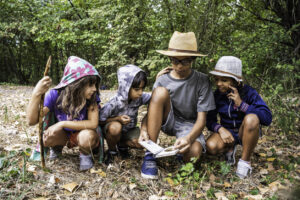Blog
Helping Anxious Campers Thrive Using the SPACE Approach
Campers across the country are getting ready to pack their bags for another summer of adventure. Prior to sending your child off to camp this year, consider using elements of the SPACE program (Supportive Parenting for Anxious Childhood Emotions) into the camp experience.
Developed by Dr. Eli Lebowitz at the Yale Child Study Center, the SPACE program is a research-based approach designed to reduce child and adolescent anxiety by changing the way adults — especially caregivers — respond to it. Originally created for parents, the core concepts of SPACE are now being adapted by educators, therapists, and camp professionals to create environments where children are gently challenged and fully supported.

Why Was SPACE Created?
Children struggling with anxiety often rely on caregivers to help them feel safe. In doing so, parents and other trusted adults may begin to adjust routines or expectations in ways that accommodate a child’s fears. These accommodations — while intended to reduce distress — often have the opposite effect over time, reinforcing the idea that the child can’t cope with discomfort.
SPACE was developed to interrupt this cycle. Through the use of supportive statements and a structured reduction of accommodations, the program helps adults send two powerful messages:
“I understand this is hard for you.”
“I believe you can handle it.”
What Are Accommodations?
Accommodations are changes adults make to help a child avoid anxiety. At camp, these may look like:
Letting a child skip swim lessons because they’re nervous.
Allowing them to stay back from group activities.
Offering frequent phone calls home.
Sitting out of meals or evening programs due to homesickness or social anxiety.
While these accommodations may offer temporary relief, they often prevent campers from building confidence and independence.
What Are Supportive Statements?
Supportive statements acknowledge a camper’s struggle without reinforcing avoidance. A supportive statement is created by providing acceptance and validation paired with a comment to increase confidence:
Acceptance and Validation + Confidence = Supportive Statement
These statements offer empathy and encouragement, helping campers stay engaged even when things feel tough. For example:
Instead of: “You don’t have to go if you’re scared.”
Try: “It’s okay to feel nervous. I’ll be with you while you give it a try.”
Instead of: “We’ll call home if you’re upset.”
Try: “Missing home is normal. You’re doing something brave by being here.”
By using supportive statements, counselors and staff help campers stretch just outside their comfort zone — increasing their confidence and resilience.

Parents play an essential role in preparing children for a successful summer. Before camp, you can begin incorporating SPACE principles in simple ways at home before camp starts:
Validate and encourage: “I know going to camp feels a little scary. I believe you’ll figure it out, and we’re so proud of you.”
Avoid promises of rescue: Rather than “If you’re sad, we’ll come pick you up,” try “If you’re sad, there are wonderful people there to help you through it.”
Practice small exposures: Encourage your child to face small challenges independently, like ordering food or spending a night away from home.
Model calm confidence: Your child will borrow your emotional tone. Show them that you’re confident in their ability to succeed at camp.
By working together — parents at home and staff at camp — we can help children face anxiety with courage, build resilience, and have a meaningful, joyful camp experience.
Hilary Davis is a Licensed Marriage and Family Therapist and Owner of Touchstone Therapy Center. She specializes in supporting children, adolescents, couples and families with anxiety, ADHD, trauma, and life transitions, and is trained in the SPACE program developed by Yale. Hilary also consults with camps, schools, and community organizations to implement evidence-based mental health strategies, and provides workshops, parent groups, and professional presentations on a wide range of emotional and behavioral health topics.
Visit www.touchstonetherapycenter.com for more information about services and resources.
For more information about SPACE, visit www.spacetreatment.net